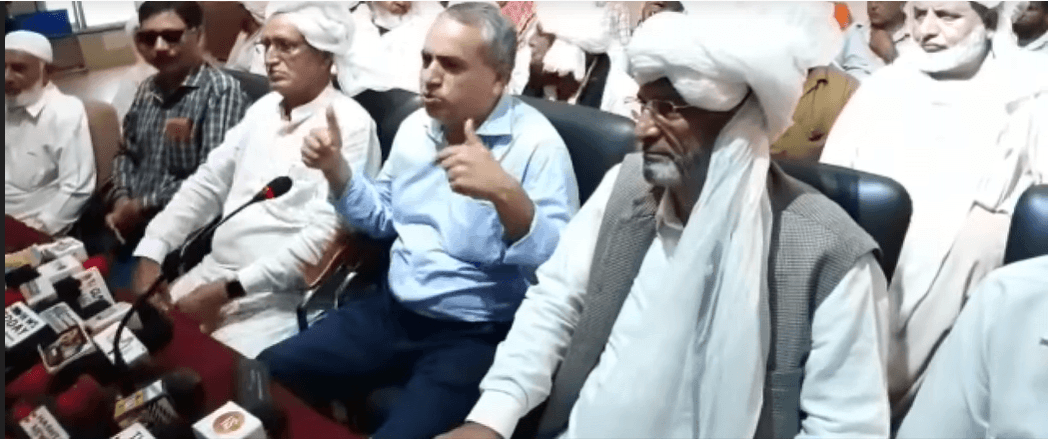
Annoyed over the decision of the Election Commission of India to allow members of the ethnic Pahari-speaking tribe to contest elections on the seats reserved for the Scheduled Tribes (ST), Gujjars and Bakerwals on Sunday announced to approach the Supreme Court to stop nine newly elected MLAs on these constituencies from taking the oaths.
Addressing a press conference, the chairman of the All Jammu and Kashmir Gujjar-Bakerwal Co-ordination Committee, Mohammad Anwar Choudhary, said that the recently held elections in Jammu and Kashmir violate constitutional provisions.
He said that nine constituencies namely Surankote, Mendhar, Budhal, Thanamandi, Rajouri, Gulabgarh, Kangan, Kokarnag, and Gurez were reserved only for Scheduled Tribe people who were declared Scheduled Tribe in 1991.
He claimed that these above nine constituencies were reserved on the Delimitation Commission's recommendation made in 2022 according to the last census held in 2011.
He further said that some other people were declared ST in the year 2024 and no political reservation was recommended for them as the earlier political reservation was according to the census of 2011.
After the abrogation of Article 370 of the Constitution, the central laws were made applicable to the UT of Jammu and Kashmir and consequently, a Commission was constituted for the Delimitation of Constituencies headed by Retired Justice Ranjana Prakash Desai.
This Commission reserved nine Assembly Seats for Scheduled Tribe, according to the census of 2011. Later on, in the year 2024, some more communities were granted Scheduled Tribe Status and according to the notification and the decision of the government, they were provided 10 percent separate reservation from the earlier Scheduled Tribes.
The leaders of the Gujjar community claimed that since there has been no new census after 2011 as such no political reservation was given to the people who were declared ST in 2024.
"But when the elections were announced by the government in the Union Territory of Jammu & Kashmir, the organizations of Gujjars had apprised the Union Government and Jammu and Kashmir Government that newly declared ST people having no political reservation cannot contest the elections on the Assembly Seats which were already reserved for ST candidates according to their population of census 2011," he said.

Allowing new STs to contest elections on the reserved seat is a violation of the constitution
Gujjars said that the Chief Electoral Officer of Jammu & Kashmir and concerned District Election Officers committed a great blunder by accepting the election forms of the people who had no entitlement to contest on the above-reserved constituencies.
"On this issue, the Gujjar leaders have raised a banner of revolt and demanded that since the elections on the above seats have been held in violation of the constitutional provisions and basic laws", he said, adding, "The elections on the above constituencies are vitiated from the stage of filling of nomination papers which has struck at the very roots of the elections, as the nomination papers of the ineligible candidates were accepted by the District Election Officers".
He said that the Gujjar leaders have submitted a memorandum to the Lieutenant Governor of J&K Manoj Sinha and copies of the same have been forwarded to the Ministries of Home, ST SCs and Chief Election Commission of India, and Chief Electoral Officer of Jammu & Kashmir.
"In their memorandum, the Gujjar of Jammu and Kashmir have implored upon the LG of Jammu and Kashmir not to notify and administer the oath to the so-called elected members from the
Surankote, Mendhar, Budhal, Thanamandi, Rajouri, Gulabgarh, Kangan, Kokarnag and Gurez constituencies.
Gujjar leaders also demanded that the Chief Electoral Officer of Jammu & Kashmir should be directed to produce the whole record of these constituencies for its scrutiny as to how such a big constitutional blunder has happened.
Gujjar leaders further said that in case the LG of Jammu & Kashmir fails to discharge his constitutional duty to check such a fraud in the constitution, the Community shall have no other option but to approach the High Court of J&K and Ladakh and Supreme Court of India for redressal of their grievances.













